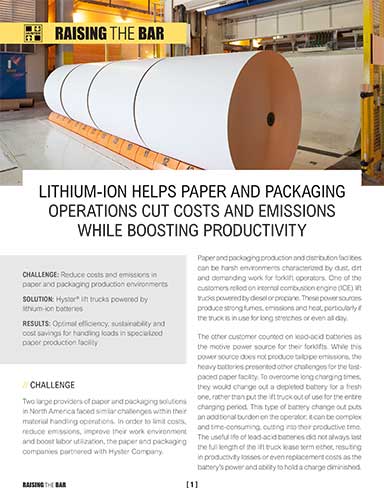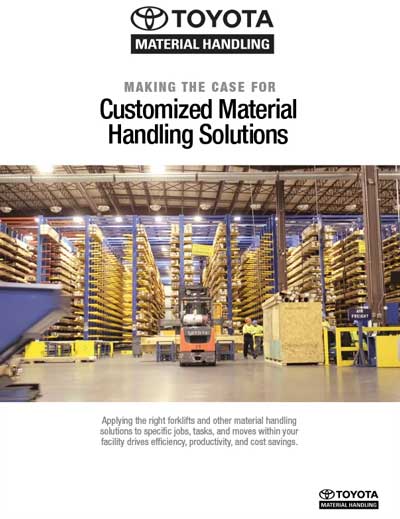Lift truck innovations that augment labor
Fully autonomous lift trucks are advancing, but so are other innovations including remote operation, as well as safety assist technologies, aimed at aiding or expanding the human workforce.
In my role at Modern, I get to cover everything from the latest in warehouse robotics and artificial intelligence (AI), to more equipment-oriented beats like lift truck attachments. To those outside of the materials handling industry, lift trucks may seem like a low-tech arena, though in reality, lift truck fleet management and sensing solutions are ripe with tech innovation.
Not only have we seen more acceptance and options when it comes to fully autonomous lift trucks, there are also a range of technologies that help make lift truck fleets using human operators more productive and supportive of safer DCs. One of these is remote operation platforms, which allow trained personnel to operate lift trucks from an office setting, even if they are in another city or a continent away from the truck outfitted for remote guidance.
Recently, I got to hear more about how remote operation fits into the challenge of making lift truck fleet operations more resilient, productive, and easier to staff by speaking with Kristi Montgomery, VP of Innovation, Research & Development at Kenco, a major third-party logistics (3PL) company. Montgomery says Kenco sees strong potential for remote operation technology as another tool in its tool belt for making its lift truck operations easier to staff and manage, along with other approaches such as fully autonomous trucks and fleet management software.
Since January of 2023, Kenco’s Innovation Lab—which includes a 10,000 square foot warehouse space—has been testing out Phantom Auto’s remote operation platform, starting with a remotely operated pallet truck, Montgomery says. The core of the vehicle is a Unicarriers pallet truck, outfitted by Phantom Auto with sensors and cameras to support remote operation. Phantom Auto also provides the remote operation software and user interface that enables a remote operation console from an office setting.
“We’ve had multiple releases of the hardware and software since we began working with Phantom Auto, and we’ve worked closely in partnership with them to continue to iterate the solution and make it better for our operation,” says Montgomery. “With this technology, the operators are working in what from a workers’ comp perspective, is a clerical environment, because they are sitting in an office environment rather than being an operator on a truck on the warehouse floor.”
One key area of benefit stemming from remote operation, Montgomery says, is that it broadens the potential workforce to include people who don’t want to physically work in a warehouse, with all the demands on the body that entails, including standing all shift, getting on and off the truck, driving over dock levelers or cracks, and dealing with temperature swings. Instead the work setting can be an air-conditioned office in a comfortable and ergonomic position, which opens the role to people with certain disabilities, experienced operators who don’t want to deal with the physical stresses any longer, or other people who would not normally be attracted to a career on a warehouse floor.
“There is an additional segment of the workforce which I think we’ll be able to tap into with remote operation technology,” says Montgomery. “Another area of benefit we see from remote operation is that it fits well with rising interest and use of gig workers. These are workers who aren’t looking for a full-time job as a manual lift truck operator, but who could be called upon as needed for a few hours.”
Kenco’s Innovation Lab has already tested out the remotely operated pallet trucks for horizontal moves and tasks like trailer unloading. Now it has begun to test one of Phantom’s remotely operated counterbalance trucks, which is capable of storing and picking pallets from multi-level racking. As of this fall, the remotely operated trucks had not yet been deployed in a Kenco production facility, but Montgomery says she’s confident they will soon see production use. Other companies using Phantom’s solution include Maersk, CJ Logistics, NFI, and ArcBest.
The test of the remotely operated pallet truck went well, Montgomery adds, including working with Phantom on refining a “trailer mode” for the truck’s sensor platform, so that the unit can work productively in the close confines of a trailer without the sensors causing it to slow or halt.
Another area of benefit with remote operation, says Montgomery, is that rather than using AI to make sense of the physical environment, it leverages the brains and problem-solving abilities of human operators. That lessens the need to have a perfectly consistent physical environment, since the human brain can make sense of factors that might cause an exception or holdup for a fully autonomous unit. In short, it’s not just one technology that Kenco is applying to its fleet productivity, but many.
“We’ve found that some of these fully autonomous trucks can also be used to augment the traditional workforce as well,” says Montgomery. “The challenge [with full autonomy] is that you are always going to have exceptions, and that’s where remotely operated units come in, because you have a human operator in control to deal with variability and exception situations.”
Overall, says Montgomery, Kenco sees remote operation as another technology which could help it mitigate the broader industry issue of a shortage of lift truck operators, while keeping up with growing order fulfillment volumes. Kenco also has tested and already deployed some fully autonomous lift trucks, both autonomous tow-tractors for horizontal transport, as well as units that can autonomously lift and handle pallets in racking. Kenco also regularly upgrades its manually operated, conventional lift trucks to improve productivity and operator comfort, and has developed and uses its own fleet management software to increase fleet productivity and monitor and manage fleet safety.
Full automation is making rapid strides, Montgomery adds, but 3PL warehouses have to deal with high variability on many fronts, from product mixes that can include outsized items like large home appliances, to the condition and arrangements of pallets on incoming trailers. That level of variability makes fully autonomous or “dark warehouses” unrealistic for 3PLs in the short term, so the best approach is targeted use of full automation, while leveraging human-centered technologies like remote operation. The same holds true for small item order picking inside a 3PL warehouse, where Kenco and other 3PLs have successfully deployed collaborative mobile robots which cut down on non-value added travel for associates.
“We use a mix of technologies and automation to augment our workforce,” says Montgomery. “We will plug in full automation where we know it’s going to work well and at the pace we need it to, but we’ll also look to leverage other technologies like remote operation that could help us expand on our potential workforce or use technologies like mobile robots that help our employees do things faster, and at very high-quality level.”













